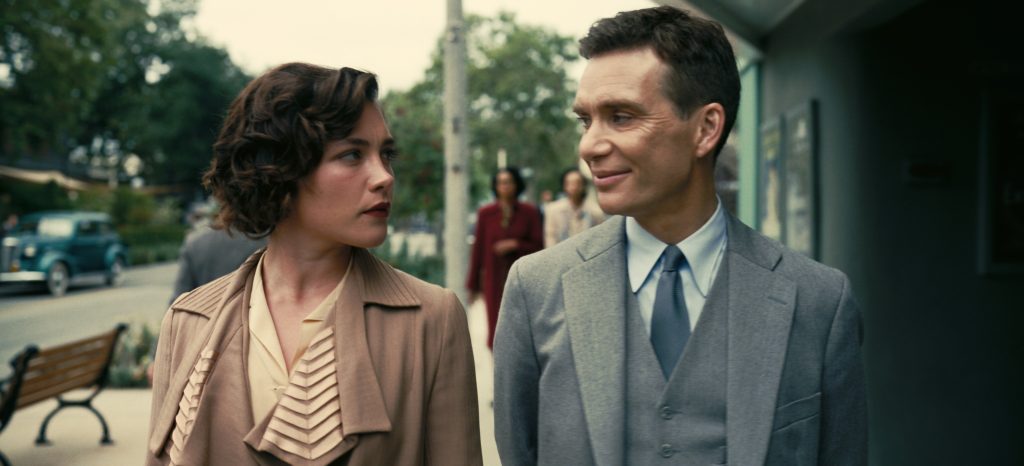In case you missed it, Christopher Nolan’s Oppenheimer opened last weekend to great reviews and huge box office receipts. The internet, as usual, had thoughts. Join us as we unpack the Oppenheimer discourse.
With Oppenheimer earning the highest-grossing non-Batman opening of Christopher Nolan’s career, as well as some of his strongest reviews, the filmmaker has plenty to be smiling about. The fact the film’s accomplished it all despite releasing on the same day as Barbie, the pink juggernaut currently dominating every social media site on the planet, is even more impressive.
The film has stirred up its fair share of controversy, however, and while some of the conclusions dark corners of the internet have come to are more justified than others, we thought we’d run through the biggest problems some people have had with Nolan’s nuclear biopic.
SPOILER WARNING: The following contains multiple spoilers for Oppenheimer
Is Oppenheimer pro-nuke?

Credit: Universal Pictures
Short answer: no. Longer answer: the film makes it very clear we’re all pretty likely to die in a nuclear apocalypse. That, for the avoidance of doubt, is bad.
On the surface, this seems to be the most baffling bit of controversy Oppenheimer has thrown up. The film could hardly be clearer on its position if Cillian Murphy turned to the camera and said nukes might be a bad idea. Oh, he does? Then where the hell does this come from?
As usual, the pro-nuke angle is much easier to see from the perspective of the marketing rather than the film itself. The most recent trailer’s framing of the story as “a race against the Nazis” could certainly give the impression that Oppenheimer is a much more conventional WWII drama, regardless of what the finished product says on the subject.
Much more interesting is the second question…
Is Oppenheimer a good guy?
This really is the million-dollar question. The film makes clear that Cillian Murphy’s character had a complicated relationship with his life’s work after leaving Los Alamos – in fact, Christopher Nolan was reportedly inspired to make the film after receiving a book of Oppenheimer’s anti-H-bomb speeches from Robert Pattinson as a Tenet wrap gift.
At the same time, Robert Downey Jr’s Lewis Strauss gives an explosive rant at the end of the film, which essentially says the quiet part of the film out loud: that Oppenheimer’s campaigns to stop nuclear escalation ring slightly hollow coming from the man who invented the bomb in the first place.
READ MORE: Barbie vs Oppenheimer | Who won the box office?
Without sounding too reductive, Oppenheimer’s lifelong tussle with his own moral compass is kind of the point of the film. There’s undoubtedly an element of Oppenheimer which suggests the titular scientist was more the victim of history than anything else, that scientific progression in that field meant someone, somewhere, was bound to make the atom bomb at some point. But it also goes to great lengths to analyse whether that’s a valid enough excuse to divorce Frankenstein from his monster.
Oppenheimer’s ability to hold multiple conflicting thoughts in his head does make for gripping drama, and the scientist’s relationship with poetry and the spiritual world plays a key role in the film. Which leads us onto an issue which has proved highly controversial in some circles…
What’s the problem with the Bhagavad Gita?
The Bhagavad Gita is one of the most sacred texts in Hinduism. In many Western circles, it’s probably best known for coining the closest thing Oppenheimer ever had to a catchphrase:
“Now I am become Death, the destroyer of worlds” – the phrase the physicist claimed to have muttered moments after the successful Trinity test.
Since whether or not Oppenheimer actually said those words when he says he did is disputed, in his film Nolan takes a slightly, uh, naughtier approach to Robert’s favourite phrase – reading it from a book propped against Florence Pugh’s bare chest while the pair are, shall we say, enjoying each other’s company.
India’s Information Commissioner, Save Culture Save India Foundation founder, and Hindu nationalist party affiliate Uday Mahurkar called the film a “scathing attack on Hinduism” in a letter posted on social media and addressed to Christopher Nolan.
The issue only compounds problems some people have had with the film’s nudity, which has seen cinemas in the UA and India cover Pugh’s character with a CGI black dress in one scene.
Is Oppenheimer sexist?

Credit: Universal Pictures
Nolan’s writing of female characters has been a point of contention in film circles for years now. Though Interstellar has a pair of accomplished female heroines in Anne Hathaway and Jessica Chastain, the women in the rest of Nolan’s films tend to lack a little agency, often defined more by their relationship to male characters than having notable goals and development in their own right.
In Nolan’s defence, he’s hardly the only filmmaker to have this problem, and his female characters are far from the most egregiously sexist stereotypes on-screen (we’re looking at you, Michael Bay). But still, the criticism is one its easy to make and difficult to deny for most of his filmography, and Oppenheimer is no different.
It’s certainly true that the only two women of Oppenheimer, Emily Blunt’s Kitty Oppenheimer and Florence Pugh’s Jean Tatlock, are both there because of their relationship with our titular scientific wonder-boy. It’s also true that, given the societal conditions of the time, that’s an issue it’s pretty hard to avoid when making a film based on a true story.
READ MORE: No, Greta Gerwig’s Barbie hasn’t killed the indie director
But then Kitty and Jean were both particularly impressive women in their own right. Both are scientists, in biology and psychiatry respectively. The film, by necessity, sidelines their accomplishments in favour of their romantic interest in Oppenheimer.
In Kitty’s case especially, though, Emily Blunt is given a decent amount of material to work with. Her annoyance at being “promoted,” she sarcastically offers, from biologist to housewife, informs much of her character, and her subsequent drinking problem and her and Oppenheimer’s marital strife do add a suitably bleak turbulence to the background of the film. Her crowning moment, too, where she tears into the committee at her husband’s hearing, is proper stand-up-and-cheer stuff.
Like most of these problems, then, the situation is complicated. But far from detracting from the quality of the film, conversations like these, as frustrating as they can often be, do demonstrate engagement with popular cinema in a way we haven’t seen for some time. Just don’t go around telling people Oppenheimer is pro-nuke; that, of all the questions addressed above, is very silly.
Oppenheimer is in cinemas now.





